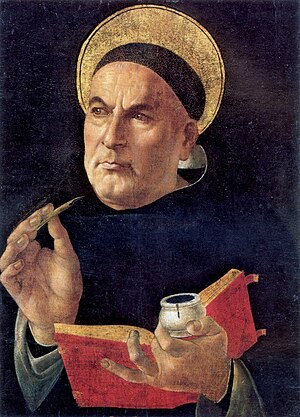Course:Law3020/2014WT1/Group N/Natural Law
Traditional Natural Law Theory: Law for the Common Good
Theorist: Thomas Aquinas
The Theory:
Essential to true law; laws which must be obeyed for reasons of justice, fairness, and morality, in addition to “mere” threat of punishment. True law is ultimately derived from a higher, non-human source and is moral and immutable.
Thomas Aquinas believes that law makers are able to see the common good and are able to recognize how to communicate the requirements of getting to the common good to the citizens. Aquinas outlined four elements that all laws must have in order to be valid and therefore be followed
- Must be directed to the common good: “Common good” is defined as the good of community, not the good of a specific individual.
- Must follow practical reason: Reasonable steps that lead to the common good outlined
- Must be made by valid lawmaker: The ruler within the community, who holds this position by reason of the natural order
- Must be promulgated: Law must be written
Impugned Legislation:
209 Section 30(1) of the Child Welfare Act provides that a court may order a child to be committed to or subject to the care and custody of the Children's Aid Society for a period of time not exceeding 12 months
19.(1) In this part and Part IV, (b) "child in need of protection" means, (ix) a child where the person in whose charge the child is neglects or refuses to provide or obtain proper medical, surgical or other recognized remedial care or treatment necessary for the child's health or wellbeing, or refuses to permit such care or treatment to be supplied to the child when it is recommended by a legally qualified medical practitioner, or otherwise fails to protect the child adequately.
28(10) that a court may hold a hearing and dispense with notice to the parents in an appropriate case, and further under section 30(1) (ii) which provides that if a child is found to be in need of protection, then only those orders set out in section 30 may be made by the court, that the hearing and the order of the court is a pro forma matter legislated into existence at the instance of a medical practitioner.
Note: During the course of adjudication the legislation was repealed.
Thomas Aquinas(TA) Analysis of the Impugned Legislation:
1. Must be Directed to Common Good
- TA stated that preservation and procreation are essential ‘goods’ to all humans and children embody this.
- The common law has long recognized the power of the state to intervene to protect children whose lives are in jeopardy and to promote their well-being, basing such intervention on its parens patriae jurisdiction. (para 88)
- The protection of a child’s right to life and health is a basic tenant of our legal system, and legislation to that end accords with the principles of fundamental justice.
- The law still recognizes the value of the family unit as the child is not allowed to be away from the parent for more than 12 months.
2. Practical Reason
- The general procedure under the Act also accords with the principles of fundamental justice: 1.The parents must receive reasonable notice of the hearing in which their rights might be affected. 2. The wardship order depriving the parents of the right to refuse medical treatment for their infant is granted by a judge following an adversarial process where conflicting evidence may be presented. The onus of proof is on the Children's Aid Society, and it has been recognized by the courts that it must present a strong case. Finally 3. The initial order granting wardship to the Children's Aid Society must be reviewed before its expiry.
- These are practical reasons leading to the objective of protecting the children.
3. The ruled and the ruler (requirement of valid lawmaker)
- Valid lawmaker is the government of Ontario.
- Follows the wishes of the community by constantly being updated by the valid lawmaker.
4. Promulgation
- As it is primary legislation, it was written down.
Thomas Aquinas Analysis of the Court Decision: (La Forest)
1. Must be Directed to Common Good
- In a natural law perspective, La-Forest is trying to protect our Charter rights, which represents Canadian common good.
2. Practical Reason
- The infringement by the Children’s Welfare Act, on the parent’s s. 7 liberty rights is a practical and necessary step in order to ensure the common good and liberty of our children.
3. The ruled and the ruler (requirement of valid lawmaker)
- The Charter is a source of law because of Canada’s Constitutional Supremacy system, as people who were in the positions to make valid laws drafted it.
4. Promulgation
- It’s written and has been written since 1982. It is there to be followed by the citizens of Canada.
